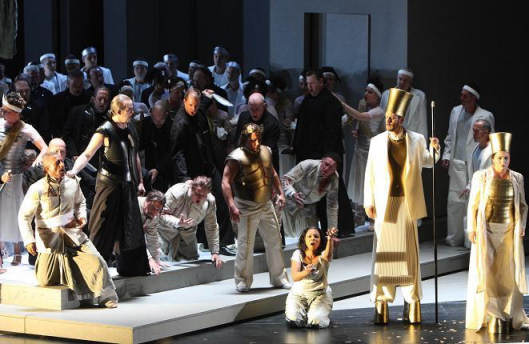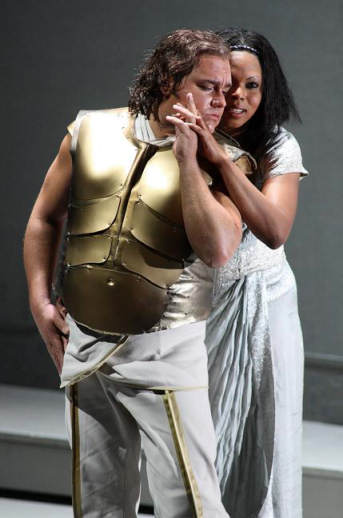Other Links
Editorial Board
-
Editor - Bill Kenny
-
Deputy Editor - Bob Briggs
Founder - Len Mullenger
Google Site Search
SEEN AND HEARD INTERNATIONAL OPERA REVIEW
Production Team
Conductor Daniele Gatti
Production Christof Nel
Set Jens Kilian
Costumes Ilse Welter-Fuchs
Lighting Olaf Winter
Choreography Valentí Rocamora i Torà
Chorus Andrés Máspero
Dramaturgy Olaf A. Schmitt
Cast:
Amneris Ekaterina Gubanova
Aida Kristin Lewis
Radamès Salvatore Licitra
Ramphis Giacomo Prestia
Amonasro Marco Vratogna
Il Re Christian Van Horn
A Messenger Kenneth Roberson
A Priestess Angela Brower

Finale - Act II
Why did the cheap seats boo Daniele Gatti? Surely his contribution could not to be blamed for the tame failure that was the new production of
Aida in Munich. Was he—for the first time conducting at the Bavarian State Opera—at fault for singers who refused to go along
with clearly indicated tempo changes? Or maybe for not playing the Triumphal March up to brass-blaring expectations? Actually, it was astonishing how much music Gatti got out of the score which, save for a handful
of absolutely delightful pieces, is a harsh throwback to the trivialities of Nabucco.

Radamès - Salvatore Licitra and Aida - Kristin Lewis
Nor were the singers too blame for a grim night at the opera. Sure, Salvatore
Licitra (Radamès) can’t act his way out of a bag and looks and moves more like
the Michelin Man than a warrior-hero, but his voice has gained heft and his
power, pushed with operatic gusto, nearly caches the lack of ease and
precision in the high notes. Kristin Lewis (Aida), who jumped in after Barbara Frittoli didn’t feel like performing the role after all, was visibly and audibly nervous on the big stage. That meant steadiness was lacking, but the ordinary beauty of her amber-hued voice came through and one wanted to like her. And, alone among the cast, at least she tried to act. Christian Van Horn’s King was unmusical in his haphazard approximation of low notes, but like Ekaterina Gubanova’s initially gray mezzo, he improved with time. Ramphis was sung well and routinely by the occasionally booming Giacomo Prestia; Marco Vratogna’s Amonasro was gruff but bearable. Angela Brower, substituting on short notice in the small role of the Priestess, stood out of the lot for her unmannered loveliness.
If that wasn’t too exciting, Christof Nel managed to undermine what was left with a direction and staging that was mostly insipid for most of the time. Singers walked across Jens Kilian’s almost-minimal set (Bauhaus meets diving platform) in Ilse Welter-Fuchs’ bland-as-linen costumes (gold plateau shoes for the ‘Walk-Like-an-Egyptian’-Disco-Party-King). Monochromism played a dirty trick on the flags of war which were swung with fervor…
but white. For three acts, the only really moving element was the continuously operating revolving stage. The ballets were an old fashioned embarrassment, the symbolic displays of violence heavy handed, and the evoked cult of death and human sacrifice culturally off by 8000 miles and 4000 years. Perhaps the work of “Conceptual consultant” Martina Jochem? The final scene, at least, was touching in principle: Aida opens her veins as she goes into the netherworld with (an apparently absentminded) Radamès; leaving only her blood stains on the bare, finally still-standing, stage. Far too little, far too late for a production so nugatory, it didn’t even deserve the massive booing that ensued.
Jens F Laurson
Further performances June 11th, 14th, 17th, 21st, and 30th. www.staatsoper.de
All pictures © Wilfried Hoesl, courtesy of the Bavarian State Opera
Back to Top
Cumulative Index Page
